Beauty innovation with Chinese startups: The perspectives and ambitions of fibona IN CHINA project members
2023.07.11The open innovation program led by “fibona” from the Shiseido Research Institute launched its fourth phase of startup selection through the activity “Co-Creation with Startups” in September 2022.
“fibona IN CHINA” hosted a startup selection under the themes of "medical beauty technology" and "holistic beauty technology." After 100 days of idea validation for startups that passed the presentation screening, the final screening was held in December 2022. Since January 2023, joint development has been underway with the startups that passed the screening under fibona IN CHINA.
Partnerships with startups began in 2019 at fibona based on the concept “the fusion of diverse people and knowledge.” For fibona, this was the second collaboration with overseas startups, following the activities in South Korea in 2021.
fibona IN CHINA is a project that Shiseido is promoting to accelerate collaboration with Chinese startups that are making remarkable technological progress and to create innovative products and services originating in China. It is currently in the proof of concept (POC) phase.
Takuya Saiwaki, the vice president of the R&D Strategy Dept. of the China Innovation Center (CIC) and Yanjie Wang, the main organizer of fibona IN CHINA, along with Kuanting Lin and Jianing Wang, who were involved in the pitch event as fibona members from the Global Innovation Center (GIC) in Japan, discussed and shared their findings, challenges and future prospects in China, which is a large market for Shiseido.
──Please introduce yourself and tell us about your connection with fibona IN CHINA.
Yanjie Wang:
I am a R&D strategy planning manager in CIC. After graduating from the University of Edinburgh in Scotland with a major in medicinal & biological chemistry, I joined Shiseido’s R&D Department in Shanghai as a skincare formulation chemist in 2016. After I joined the R&D Strategy Dept. in 2022, I started Shiseido China’s first open innovation program, “fibona IN CHINA.” This program is aiming to collaborate with unique Chinese startups and create new beauty solutions by combining their proprietary technologies with Shiseido's science. I am currently in charge of communicating with the Chinese platform, Plug & Play China, companies from the final selection, and Japanese fibona members as well.
We are responsible for identifying and developing the best beauty solution technologies specifically for Chinese consumers. We are looking to accelerate innovation by co-creating with various partners in China to create new beauty-related businesses as well as cosmetics-related technologies. I have been in charge of cosmetic formulation development, but I now realize that innovation in formulation alone is not enough to meet the diverse beauty needs of Chinese consumers and to achieve our vision toward 2030 of being a "PERSONAL BEAUTY WELLNESS COMPANY.”
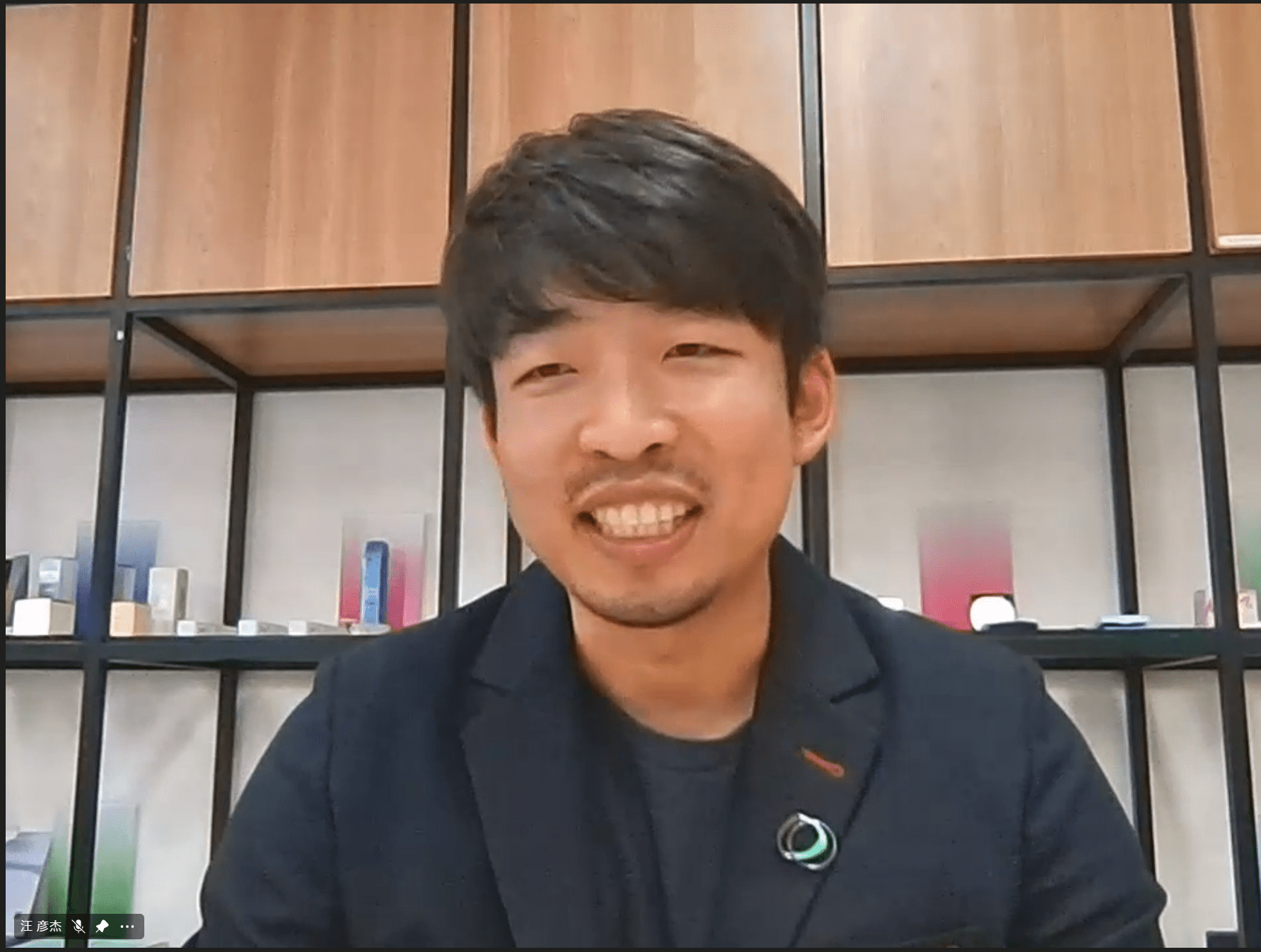
Takuya Saiwaki:
I have been working at the Shiseido China Innovation Center as the vice president of the R&D Strategy Dept. since 2020 when I transferred from GIC. Here, we plan and promote R&D strategies, search for new technologies related to beauty, and plan research for new businesses. In Shiseido China, in addition to the business teams for global and Chinese brands, there is also the China Business Innovation & Investment Office (CBI), which plans new businesses, and a team part of the Shiseido Beauty Innovation Fund, which functions as a CVC fund. R&D works in close communication with the business teams.
China's GDP growth rate is increasing by a few percentage points annually (compared to the same period last year). I am working in a country with a population of 1.4 billion, with excitement from the strong impact of steady GDP growth on business. What I want the most is to combine external technologies and Shiseido's technology assets to create new value. I am currently collaborating with various external partners. I served as a judge for the Korean startup selection in 2021, and I wanted to try to get involved in fibona IN CHINA.
Kuanting Lin:
I am a material developer, having worked in GIC for four years. I'm working on specific products while also looking for new materials, trying to optimize their application to different brands and products. I was born and educated in Taiwan. I also studied for another degree in Hong Kong and have lived in different cities around China. After coming to Japan, I started to work for Shiseido. Living in Japan and working in a Japanese company has given me a whole new perspective on life, especially in terms of affecting my mindset and point of view. I share the same viewpoint with Saiwaki. I also believe that Chinese growth has had the biggest impact on the global market.
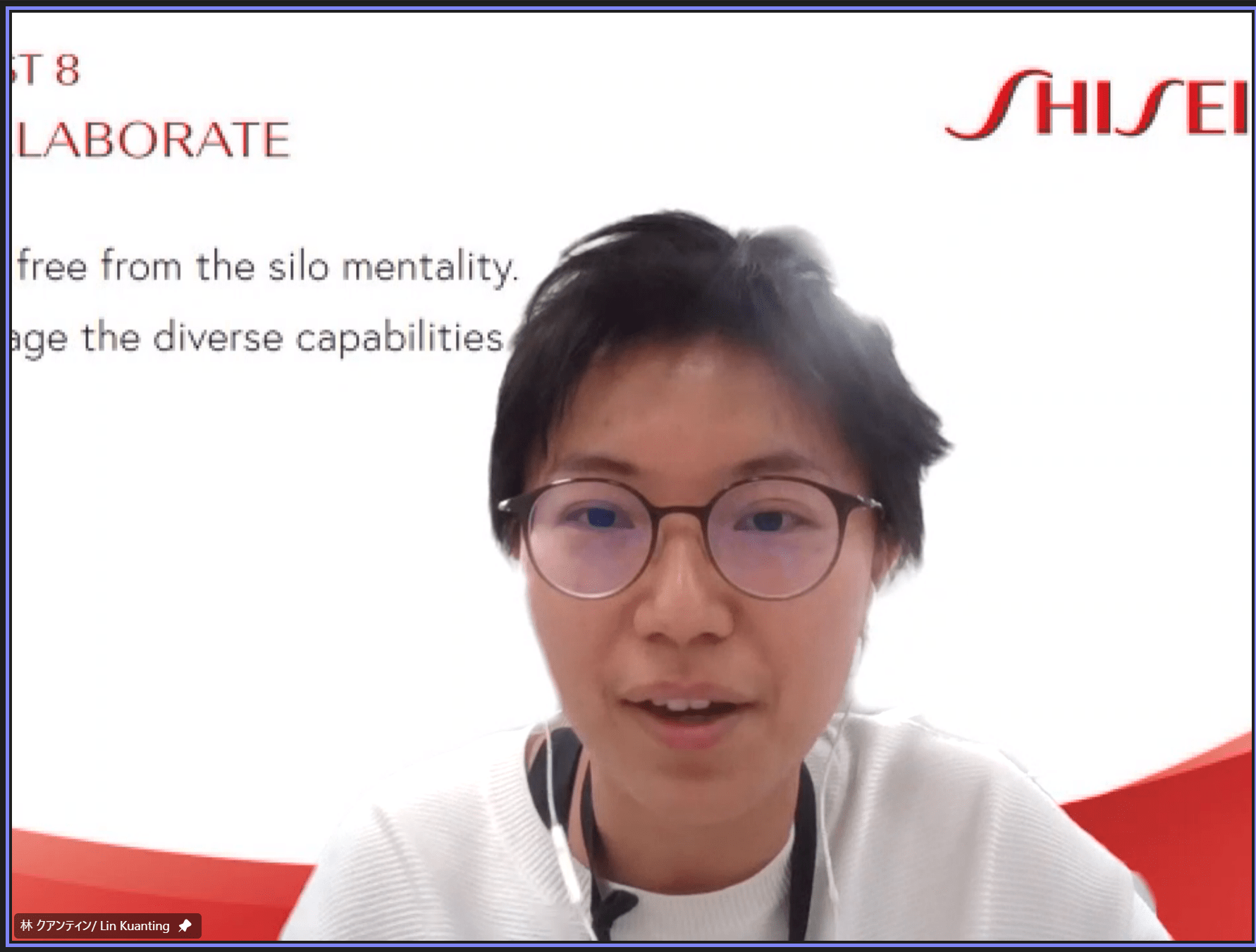
Jianing Wang:
I'm Chinese, having been born and educated in China, and I’m working in GIC. I studied at Hokkaido University in Japan, where I got both a bachelor’s and master’s degree. In Shiseido, I first worked as a formulator for hair care products for one year, and then for skin care products for four years. Since I’ve lived more than half of my life in China and also in Japan for more than 10 years, my identity is composed of both Chinese and Japanese elements. I think Japanese people are very unique. They have their own way of thinking, doing business, and building relationships with people from other countries. Thanks to my extensive experience, knowledge and adaptation to living in Japan as a Chinese person, I’m confident that I am a suitable member and coordinator for fibona IN CHINA’s pitch events, bringing value. In addition to this, Lin and I are former fibona Japan members. Besides fibona, when projects in China and other Asian countries arise, we join as members of the secretariat.
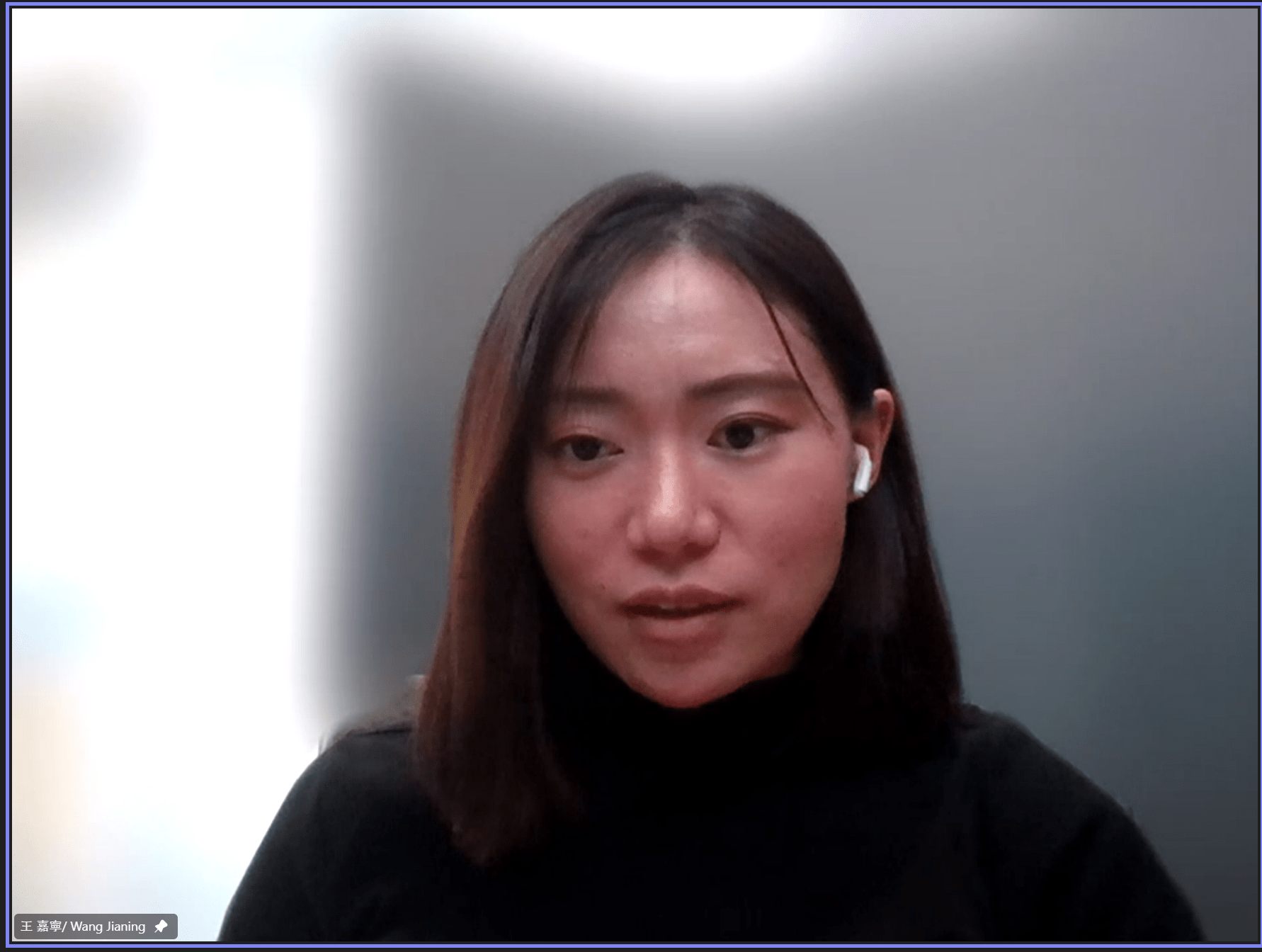
──Please tell us about the starting point and background for fibona IN CHINA.
Takuya Saiwaki:
Firstly, let me explain two points about the differences between Japan and China to help you better understand the background for the idea of expanding fibona activities in China. The first one is that China, as a country which invests in developing advanced technology, also has huge assets in terms of the world's top technologies. China's scientific research budget has overtaken Japan, and now it is only second to the United States. The second point is that Chinese consumers are highly interested in new technologies and services, and they like to see them widely applied to daily life. Considering this background, I thought that co-creation with Chinese startups would be a great match in terms of creating new products and services in China and making it easier to take on challenges as a business.
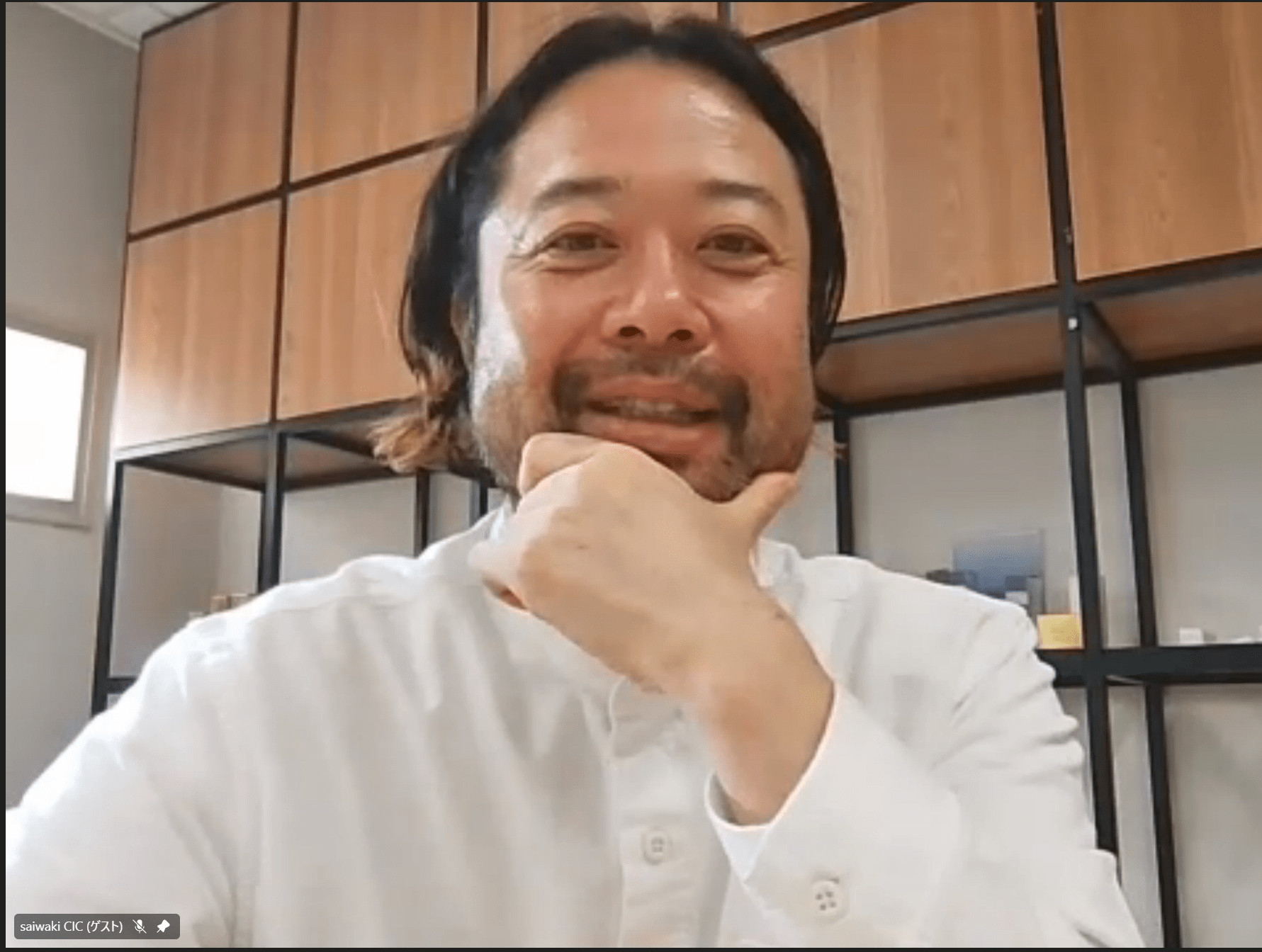
Yanjie Wang:
The fibona IN CHINA program launched last year when I transferred from the Cosmetics Formulation Development Dept. because I expressed my wish to start this program to Saiwaki.
The reason I wanted to join this team was the technology. China's technological innovation is remarkable as a global innovation leader. The Chinese government’s strategy is to accelerate tech innovation. A good example of this is the C919, China's first domestically-manufactured passenger jet, which successfully completed a commercial flight from Shanghai to Beijing in May. The number of Chinese consumers is enormous, their needs are diverse, and many of them are seeking something new. In order to satisfy all their needs, we need more innovation in cosmetics and beyond for Shiseido China. We are now aiming to make good use of external technologies in China and ultimately Shiseido’s original innovations. The uniqueness of China in itself is also very advantageous for the fibona program.

Kuanting Lin:
Yes, I agree with you, Yanjie. It is really a wonderful opportunity for all of us. I still remember when I was in Hong Kong and China. Many of my friends joined innovation startups, and even small companies back then are now growing really fast thanks to China’s revolutionary growth. Together with that, I am really looking forward to seeing the fibona project succeed in China.
Jianing Wang:
Yeah, I can’t wait to see the results from fibona IN CHINA and collaboration partners chosen by Saiwaki and Yanjie. I am excited to cooperate with Shiseido China as well. When I came to Japan 12 years ago, I was just a young girl from China who had the ambition to learn about advanced Japanese technology from a Japanese university. But after 10 years of living in Japan, my feelings have changed a lot. I see the great change, growth and acceleration in China, which makes me very proud of being Chinese. From my point of view, it is not just Japan but also other countries that must cooperate with the Chinese market nowadays.
──How were the themes for the startup selection set?
Yanjie Wang:
For fibona IN CHINA, we set two themes. The first was the area of “medical beauty” to discover technologies that are expected to have advanced effects that go beyond cosmetics, typical to cosmetic medicine and the other one was the area of “holistic beauty” to discover techniques to beautify the skin through lifestyle-oriented activities such as exercise, food, and sleep.
Takuya Saiwaki:
Based on Shiseido's vision of becoming a “PERSONAL BEAUTY WELLNESS COMPANY,” if we were to launch fibona, I wanted to aim for technology and output that goes beyond cosmetics. On the other hand, I was also not sure whether Shiseido, as a foreign company, would be welcomed by Chinese startups. As members of fibona IN CHINA, we narrowed the list down to 20 companies based on the assessment of the technological originality of 200 startup candidates. Then, we held a one-on-one meeting with each to decide on the eight startups that would attend the pitch contest.
What we emphasized in this process was the concept of "co-creation," which means "creating something new that has never existed before by utilizing the assets of both parties." Although some of the startups we were communicating with gave up in the middle of the process, the startups that participated in the pitch contest fully understood the concept of co-creation and had the right willingness to create new value by enhancing each other's strengths. In China, this is the first time such co-creation in a new business category other than cosmetics has been undertaken by Shiseido.
──What are the strengths and unique points of Chinese companies?
Yanjie Wang:
I think there are two unique points of Chinese companies. One is the use of frontier technology. We have seen that many startups are using frontier tech for innovations, such as non-invasive diagnosis technology. It is surprisingly so easy to diagnose health conditions by using AI-powered deep learning technology. Another one is talented Chinese individuals with global experience and knowledge. Many founders of Chinese startups have studied at top global universities such as Stanford university, MIT and so on. They are well educated from an international perspective.
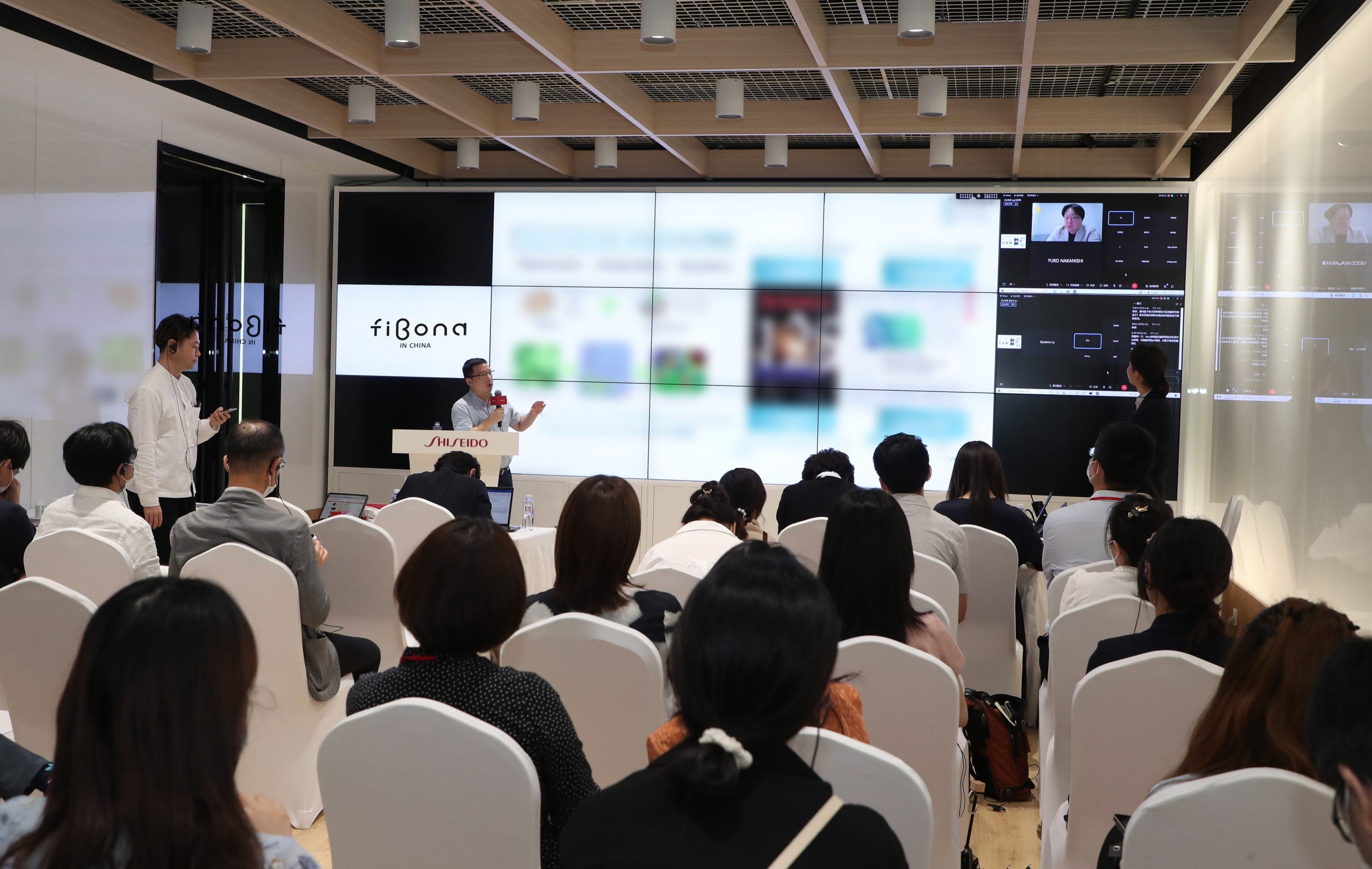
Takuya Saiwaki:
I would describe them using the three key words “agile,” “flexible,” and “ambitious” in terms of their mindset and point of view. They are quick to respond and eager to improve while also coming up with new alternatives. The advantages and discoveries of fibona IN CHINA were different from a conventional partner search, and we gained a lot of inspiration through the project.
Jianing Wang:
I totally agree with you about those three key words. Especially the word “agile” is seen negatively in Japan as meaning “hasty,” while in China it is just a positive. In China, it is widely believed that when the direction is roughly correct or agreed on by the majority, you can move forward and if it’s wrong, you can always just go back and adjust it.
Kuanting Lin:
Yes, I have very similar feelings towards this topic. Chinese startups are very ambitious. Both small startups and big companies have a very strong ambition to succeed on a large scale. I feel that there are differences in the mindset behind business models that stem from the culture. While the Chinese business model can be described as being vertical, the Japanese one is both vertical and horizontal. I mean, for Chinese companies it’s enough to agree on things between two parties but in the case of Japanese companies, much wider consensus and internal agreement are required, which always takes a lot of time. In order to move forward with the next step and also in terms of flexibility, I feel that speed is very important.
Yanjie Wang:
I also feel the difference in speed between the two countries.
Jianing Wang:
Chinese companies are much faster when it comes to making changes. They don't tend to dwell on failure or negative experiences.
──How have the advantages and discoveries of fibona IN CHINA been different from those of a conventional partner search? And what insights have been gained through the project?
Yanjie Wang:
Done in the conventional way, partners are often raw material companies or OEMs. And there is a rigid, concrete evaluation system for the selection process when making cosmetic products. Compared with that, our fibona pitch events are totally different.
First of all, we find collaborators that utilize unique technologies from external ecosystems. I mean, most of the startups are not from the cosmetics industry so we don’t have any experience or references in terms of collaboration. We are also actively communicating with startups in other industries to discover new ideas and concepts that can be used for new business endeavors. In our search for a partner, we focused on whether we could create a unique product or service by combining their technology with Shiseido's assets. Compared to the conventional way, this partner search, which focuses on creativity and novelty through co-creation, has been a new challenge for us. We are always moving forward with the mindset of taking on new challenges, although the uncertainty of feasibility can make us feel uneasy at times.
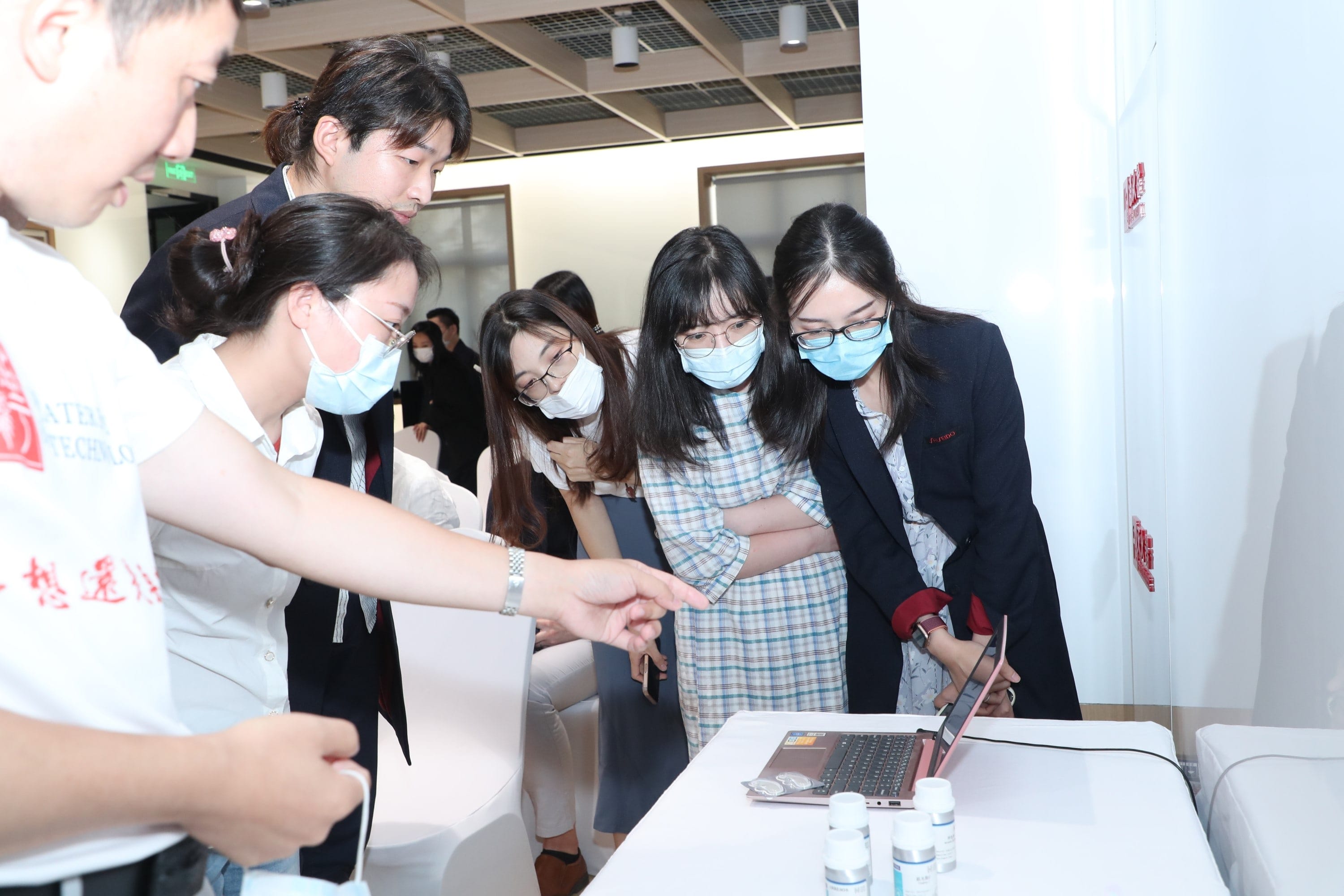
Takuya Saiwaki:
Yes, we highly value the idea of “co-creation.”
Kuanting Lin:
I was very surprised and happy to hear about the large number of companies that applied to fibona IN CHINA. Even though so many consumers are interested in beauty, I have long wondered whether it is enough to offer only cosmetics or whether we should offer some other value. I really believe that by creating new beauty solutions with partners from other industries, we can bring beauty to more people. I feel honored to have been part of the process for finding good partner companies through the pitch contest. Jianing, you felt the same way, right?
Jianing Wang:
Yes, while I was learning about the eight finalists and looking at their presentations, I felt impressed by how cool they were! Before the pitch event, I had also reviewed many presentations from Japanese startups. From that experience, I could see the differences as well. While Japanese companies brought ideas mostly related to basic research, raw materials or holism, the Chinese ones were more modern and technical, with a focus on areas such as analysis, AI and so on.
Yanjie Wang:
The first word that comes to mind to express my feelings is “excited.” Previously, we had only gained knowledge on cosmetic formula technology, but with this open innovation, we had the chance to learn all kinds of knowledge and market trends to fuse with CIC researchers. It has also helped broaden our insights and horizons regarding future innovations.
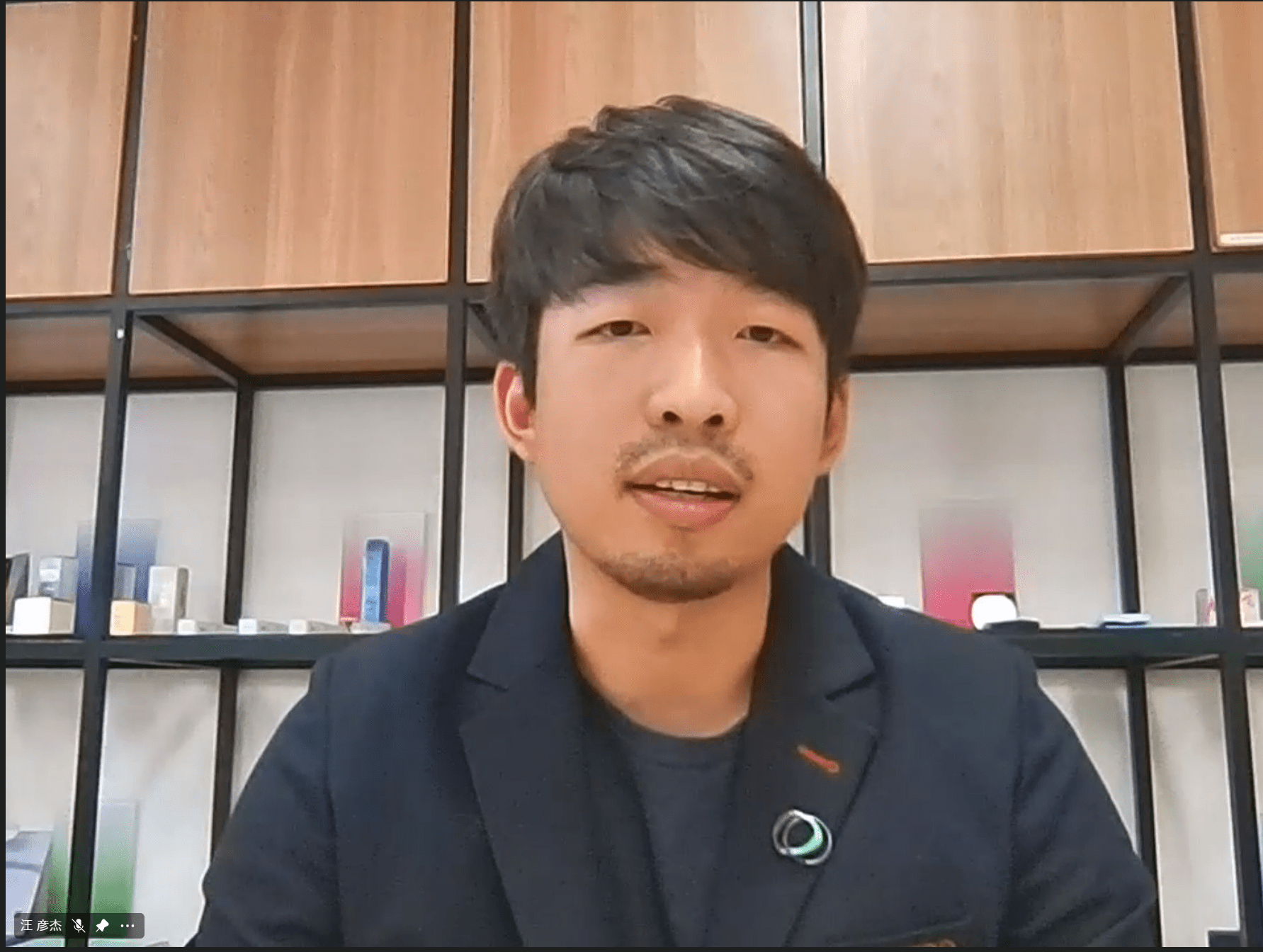
Takuya Saiwaki:
It was very exciting for me too, but I feel that there are still some steps that require improvement. Of course, our goal is to create innovation by combining startups’ technology with our own. However, rather than just creating new technologies, it is also very important to develop new consumer experiences. But I feel that we haven't reached that level yet. I assume that the reason for this was that we didn’t have enough time to completely prepare. But overall, I believe that diversity is the key to getting even more sophisticated results. This time, Kuantin and Jianing, two GIC members, supported the pitch contest, which greatly helped us. Therefore, I wish to incorporate even more diversity into our activities in the future as well.
──What are your prospects for the future and what do you want to achieve?
Yanjie Wang:
So, as for our future prospects, I wish for more open innovation, as it is very important. I hope open innovation will also become the new norm in the China Innovation Center.
fibona IN CHINA was launched during the pandemic. Although the Covid-19 pandemic has had a huge impact on our industry, it also made us understand the value and importance of open innovation. Since the world, market and consumers are changing so fast, we need to find a way to leverage both external and internal knowledge to create innovation while staying true to our DNA, to establish a winning position in the industry.
With the creation of innovative technologies and the discovery of unique consumer insights, I want to help Shiseido revolutionize the cosmetic industry like Apple did for the cellphone industry with the iPhone. My personal ambition is to make an achievement on the level of the iPhone.
Takuya Saiwaki:
Yes, our ambition is to create innovation from China and spread it globally. At the same time, I also believe that we must not only use and focus on technology, but also create value from it and refine it for our consumers. In this process, I want to emphasize the value of “diversity” once again. As we are cooperating with GIC and other regional innovation centers such as in Europe, the United States, Singapore and South Korea, worldwide diversity is one of Shiseido R&D's strengths, so we should make more use of it in our future activities.
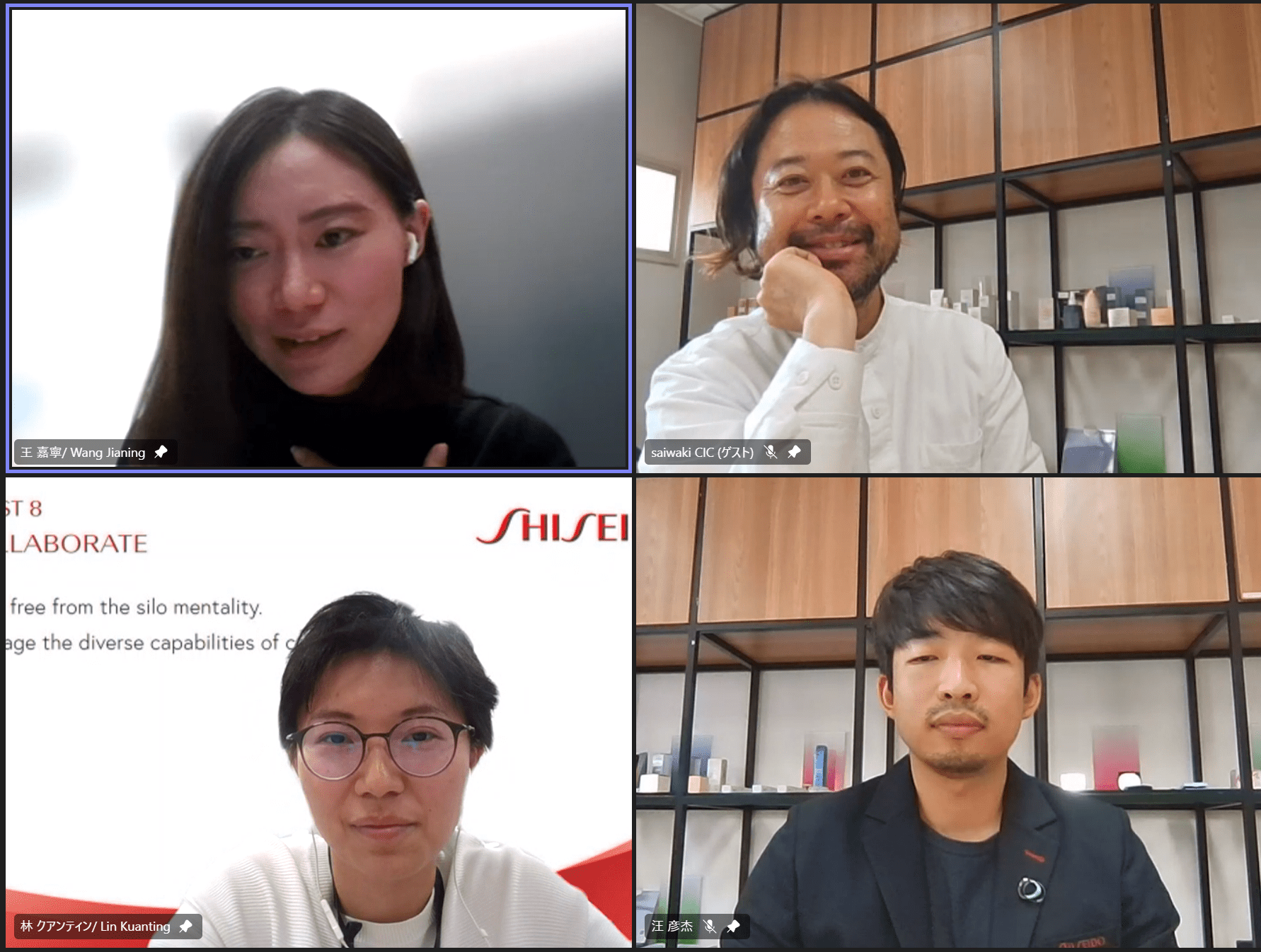
Kuanting Lin:
I personally feel that working with Saiwaki has helped increase diversity in GIC. My ambition is to continue working closely with CIC and creating new value to further grow Shiseido.
Jianing Wang:
I would like to mention that in addition to regional diversity, there is internal and generational diversity in GIC (laughs). And it should also be noted that within fibona IN CHINA, Japanese people and their way of thinking are also elements that create diversity. I think this is helping make our company’s future even more colorful.
(Text: Sachiko Kutsuke Edit: Kaori Sasagawa)
Project

Co-creation with startups
Activity